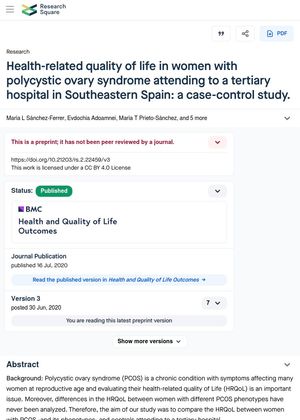Health-Related Quality of Life in Women with Polycystic Ovary Syndrome Attending a Tertiary Hospital in Southeastern Spain: A Case-Control Study
June 2020

TLDR Women with Polycystic Ovary Syndrome (PCOS) have a lower health-related quality of life, especially those with an anovulatory phenotype, and need specific interventions to improve it.
In a study conducted between 2014 and 2016, 117 women with Polycystic Ovary Syndrome (PCOS) and 153 controls were examined to compare their health-related quality of life (HRQoL). The study found that women with PCOS, particularly those with an anovulatory phenotype, had a significantly lower HRQoL compared to the control group. This was measured using the Short Form-12v2, which includes eight scales and two component summary scores for physical (PCS) and mental (MCS) health. Women with PCOS scored lower in PCS [mean (95%CI): 53.7 (52.5-54.9) and 52.9 (51.5-54.4) vs. 55.8 (54.8-56.8); p-values<0.01] and five out of the eight scales (p-values < 0.05) after adjusting for age, body mass index, infertility, educational level, and current occupation. However, there were no significant differences in the MCS between women with or without PCOS or its phenotypic subtypes. The results suggest the need for specific interventions to improve the HRQoL in women with PCOS.